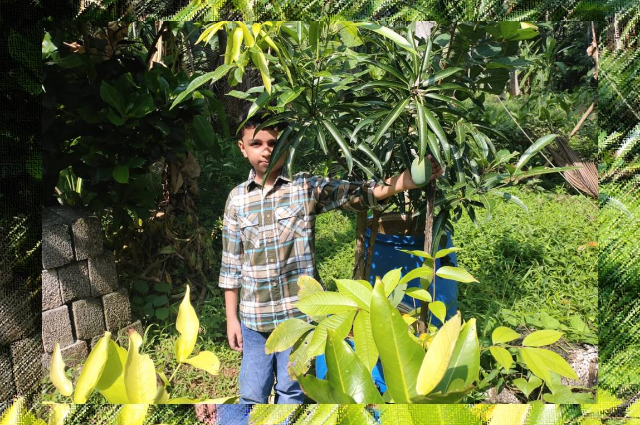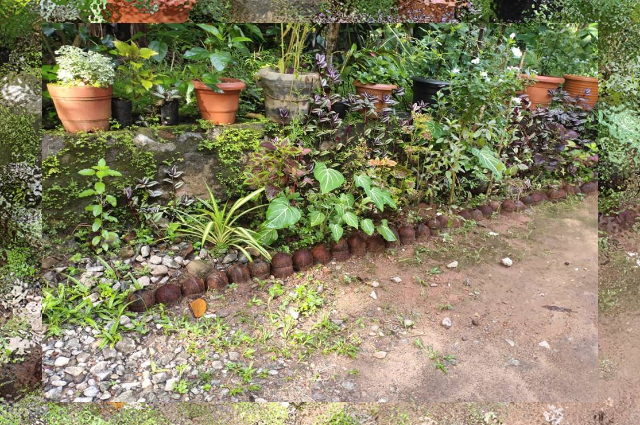
“Hands In The Dirt, Head In The Sun, And Heart With Nature: This Is The Glory Of Gardening. Gardening Not Only Feeds The Body, But It Also Feeds The Soul.” I was nearly overwhelmed in the past owing to several struggles, but when I engaged with gardening, all of my worries disappeared. Now I have a fabulous life with my soul family and my garden. Well, that's what prompted me to present a few of my most recent research, which will be incredibly beneficial to those who are dealing with tough situations.
Introduction
Mental health and well-being can positively shake practically every area of a person’s life like education, employment, family, and relationships. It can assist people in realizing their full potential, achieving their goals, dealing with hardship, working efficiently, and contributing to their community and society. There are numerous advantages to promoting mental health and well-being. It enhances health, longevity, productivity, educational and economic outcomes, as well as reducing violence and crime.
According to UK Department of Health advice and the Cross-government framework for wellbeing, a pleasant state of mind and body, feeling safe and able to manage, with a sense of connection with people, communities, and the wider environment.” The document proposes that everyone work to improve their mental health and well-being. This framework for public mental health identifies five important areas for action to enhance wellbeing:
- A life-course approach
- A positive start in life
- Healthy later years
- Create strength and safety
- Resilience and develop sustainable communities
Mental Health and Well-Being
Greens, as well as gardening as a hobby, have been found to improve people’s health and happiness, as a result of both physical activity and the usage of the garden as a place for mental rest and stimulation. Mind, a UK organization, released a study in 2013 detailing the outcomes of 130 Eco therapy program across England. “Eco therapy” is defined as “an intervention that improves mental and physical health and wellbeing by encouraging people to engage in outdoor activities such as gardening, food production, or environmental work.” They concluded that Eco therapy services can help people look upon their mental well-being, support people who may be at risk of developing a mental health problem and assist people with existing mental health problems based on several external evaluations.
Gardeners appear to recognize the benefits of gardening to their mental health; in a study conducted in the United States, gardeners participating in the Philadelphia Gardening Program were asked why they gardened. Interviewed 144 gardeners and discovered that recreation (21%) was the most important reason, followed by health benefits such as “mental health” (19%), “physical health and exercise” (17%), and “product quality and nutrition” (16%).
Aside from gardening, witnessing green space and being in green space has been found to improve mental health and reduce stress. Views of ‘green space’ at work in the form of plants can already increase performance. “Less green nature indicates decreased mental wellness, or at least less opportunity to recuperate from mental stress.” In a review, Sugiyama, found that perceived neighborhood greenness was positively connected with mental health along with walking and social cohesiveness, but not with physical health.
The hypothesis that access to restorative places like gardens helps to restore people’s directing attention on tasks and so improves mental sharpness has been developed more generally. This is also known as attention restoration theory (ART), which has been researched and reviewed about the cognitive benefits of interacting with nature. When children have access to green space, and pupils have a perspective that is dominated by plants rather than buildings and pavement, they are said to do better tactual. Green space can also help with symptoms of attention deficit hyperactivity disorder (ADHD).
Defining ‘life satisfaction’ objectively is more difficult than defining bodily or mental health. Life satisfaction is a broad term that reflects a person’s continual sense of well-being and contentment with their current circumstances, although it lacks a clinical definition. For example, ‘happiness’ is a state of mind that most people strive for without necessarily needing to describe it precisely. There is strong evidence that physical movement improves mood and mental health, and that gardening can help with this.
Gardening, when done in a non-competitive manner, can engage individuals in a variety of ways and, if done well, can lead to a sense of accomplishment or success. Completing a physical task can also give you a sense of accomplishment and calm. The gardening year’s rhythm and resource recycling can certainly assist to ground people in natural cycles, which appears to foster a more general sense of well-being. “Those who are interested in gardening find life more satisfying and feel they have more positive things happening in their lives than those who are not.

Wilson proposed the notion of ‘biophilia,’ which claims that humans have an inbuilt ‘tendency to focus on life and lifelike processes,’ and that knowledge of the natural world particularly plants and animals contributed to the human race’s survival. In practice, this means that people feel most at ease in environments in which they can identify with life processes.
Haviland-Jones, Maller, and Schultz provide evidence that demonstrates that good physical health and psychological well-being are linked to pleasant emotional settings and the natural environment. It’s been hypothesized that these emotions are rooted in our species’ evolutionary psychology. It has been proposed, for example, that the reason humans find some landscape elements aesthetically pleasant is that they have aided our species’. This contains components such as water, plants, animals, and trees, all of which can be found in aesthetically beautiful gardens. People’s emotions can be triggered by even the simplest aspects of gardening. Flowers, for example, are a potent pleasant emotion inducer that affects emotional reactions, mood, social behavior, and even memory in both males and females in the short and long term.
Gardening For Stress and Depression
Stress and stress-related disorders have skyrocketed in Western society, and they are on the rise everywhere. Increased muscle tension, increased blood pressure, increased pulse, increased sweat gland production, increased adrenalin and hydrocortisone production, and slowed digestive system activity are all physiologic manifestations of stress. Many ailments are caused or worsened by long-term stress. Cardiovascular disease, high blood pressure, depression, anxiety, thrombosis, digestive issues, chronic fatigue, aches and pains, allergies, and an increased risk of infection are just a few of them. Long-term stress can be a symptom of underlying mental illness or lead to it.
Gardens appear to be helpful to alleviate stress in a variety of ways:
- By simply allowing views of green space or a (semi-)natural scene to be permitted:
Numerous studies have shown that simply looking out a window at a green environment can help people relax and reduce stress levels, as seen by shorter recovery times from illness and fewer stress-related occurrences,
- By allowing you to immerse yourself in a natural setting:
Several studies have found that simply enabling people to be immersed in a natural setting can reduce stress, boost relaxation, and improve recovery. This is particularly true with gardens, as evidenced by the number of people who just like sitting in their gardens on weekends since it allows them to feel connected to nature; as Mayer put it in his work “the role of connectivity to nature.”

- People are actively engaged in a natural setting:
Combining the impacts of work or exercise in a natural or green setting may be the most efficient strategy to alleviate stress, and exercise in such a context certainly appears to have larger effects than exercise alone or exercise in ‘unnatural’ or even unpleasant situations.
In a field experiment with 30 allotment gardeners in Amsterdam, Van den Berg and Clusters, evaluated the stress-relieving effects of gardening in a field experiment with either gardening or reading on their allotment for 0.5 hours. During the recuperation phase, both gardening and reading resulted in lower cortisol levels, but the drops were substantially greater after gardening. After gardening, my mood completely recovered, but it deteriorated even more after reading. These findings, according to the authors, provide experimental evidence that gardening can help people cope with acute stress.
According to Swedish research, those who have access to a garden had much fewer stressful events each year. They discovered that those who lived in apartment buildings without a balcony or outdoor space experienced an average of 193 stressful events per year. If respondents had a balcony, this was lowered to 126 stress instances. Those with a tiny garden experienced 86 stress events per year, while those with a large leafy garden experienced just 65 stress events per year on average. They also discovered that the more people used their gardens, the fewer stressful events they experienced each year.
Hawkins has added to this by investigating allotment gardening in Cardiff, Wales. The activity groups of ‘indoor exercise,’ ‘walkers,’ ‘allotment gardeners,’ and ‘home gardeners’ all showed a substantial variation in perceived stress levels, according to their findings. Participants in indoor exercise reported much less stress than allotment gardeners. Hawkins looked at an older adult sample of community allotment gardeners with a focus on stress recovery, and the results show that allotment gardeners like both ‘doing’ the gardening and ‘being’ in the garden setting, with a wide range of health and wellbeing advantages.
Gonzalez investigated therapeutic horticulture in clinical depression in Norway. The data for the study was collected on four farms near Oslo before, during, and immediately after a 12-week therapeutic horticulture program to see if there was a change in depression severity, perceived attentional capacity, or rumination. The results showed that 50% of the participants experienced a clinically relevant decrease in depression and that the participants’ improvements in ‘Beck Depression Inventory scores were maintained at the 3-month follow-up. If this is the instance of western countries then how much will the Indians score from nature about gardening as the country itself is sufficient with enormous green?
Dementia and Alzheimer's disease Patients
Dementia is a chronic illness that has a significant influence on a person’s health, personal circumstances, and family life. Alzheimer’s disease is the most common type of dementia, and it usually affects persons over the age of 70. The term “early-onset dementia” refers to symptoms that appear before the age of 65. Dementia has a significant influence on the individual, but it can also have a significant impact on family and friends. Dementia causes a steady decline in several aspects of brain function, including memory, thinking, speech, and daily living skills. Individuals may experience behavioral and psychological symptoms such as sadness, psychosis, violence, and wandering as a result of this decline, complicating management.
The National Dementia Strategy of the United Kingdom, published in 2009, intends to improve dementia services in three areas: more awareness, earlier diagnosis and intervention, and higher quality of care. According to a Lancet analysis, the incidence of dementia cases in India is anticipated to nearly treble by 2050. According to a January 2022 analysis, the total will rise to 11,422,692 from 3,843,118 in 2019.
Care plans should cover activities of daily living that maximize independent activity, adapt and increase function, and reduce the need for support. The garden and gardening activities provide a non-pharmacological approach to achieving these goals, and horticultural therapy can be used to improve the quality of life for the ageing population, resulting in high levels of patient satisfaction and potentially lowering the costs of long-term, assisted living, and dementia unit residents.
Several studies have indicated that therapeutic gardens and horticultural activities assist dementia sufferers. Detweiler concluded that several preliminary studies have reported the benefits of horticultural therapy and garden settings in reducing pain, improving attention, reducing stress, modulating agitation, lowering as-needed medications and antipsychotics, and reducing falls in the elderly.
Jarrot and Gigliotti studied whether planting, cooking, or craft activities engender differential responses from adult day service participants with dementia, and in a later study the same author team) evaluated responses to horticultural-based activities for randomly assigned groups in eight care homes and compared them with responses to traditional activities. Horticultural activities reached groups of people who would otherwise find it difficult to participate in activities, resulting in higher levels of adaptive behavior as well as active and passive involvement. Similarly, Yaskawa showed improvements in communication, engagement, behavior and cognitive abilities in a group of patients with Alzheimer’s who participated in horticultural activity over three months.

D’Andrea reported that participation in horticultural activities resulted in the maintenance of memory and a sense of wellbeing, as well as a higher overall functional level than the control group, in a study investigating the use of horticultural therapy to prevent the decline of mental abilities in patients with a Alzheimer’s type dementia. Connell evaluated the effects of outdoor and indoor activity program on sleep and behavior in nursing home patients with dementia, finding that the outside activity group had significantly better sleep patterns and less verbal agitation. Luk found no significant effect on the reduction of agitation among nursing home residents with dementia in a Hong Kong nursing home but did find a significant drop in hostile behavior.
Hewitt studied the influence of therapeutic gardening on adults with young-onset dementia, taking into account both dementia patients and their caregivers. Their preliminary findings revealed that 12 months of structured gardening had a positive influence on the wellness, cognition, and mood of patients with young-onset dementia. The relationship between participants’ well-being and their cognition was given special attention, as the study’s findings revealed that well-being can be maintained despite cognitive impairment. The gardening group’s benefits were found to include self-identity and purposeful activity, with participants feeling helpful and valued, as well as a sense of accomplishment.
Reference
- Adhémar, A. J. Nature as clinical psychological intervention: Evidence, applications and implications. Master Thesis, Institute of Psychology, University of Århus, Denmark
- Berman, M.G, Jonides J., Kaplan S. The Cognitive Benefits of Interacting With Nature. Physiological Science
- Chen, Hui-Mei, Hung-Ming Tu, and ChaanIranan HoChen Exploring Dimensions of Attitudes toward Horticultural Activities. Hort Science
- D’Abundo, M. L., and Carden, A. M. “Growing Wellness”: The possibility of promoting collective wellness through community garden education programs. Community Development
- Day L. Healing Environments and the Limits of Empirical Evidence. American Journal of Critical Care
- Hine, R., C. Wood, J, Barton and J. Pretty the mental health and wellbeing effects of a walking and outdoor activity based therapy project. A Report for Discovery Quest and Julian Housing. University of Essex, UK
- Mayer, S. F., F. C. McPherson, E. Bruehlman-Senecal and K. Dolliver Why Is Nature Beneficial? The Role of Connectedness to Nature. Environment and Behavior
- Van den Berg A.E. and M. H. G. Clusters gardening promotes neuroendocrine and affective restoration from stress. J Health Psychol
- Zick, C. D., K. R. Smith, L. Kowaleski-Jones, C. Uno, and B. Merrill Harvesting more than vegetables: The potential weight control benefits of community gardening. American Journal of Public Health
